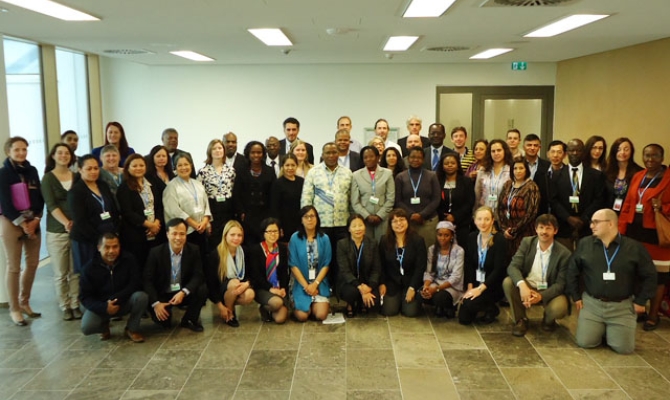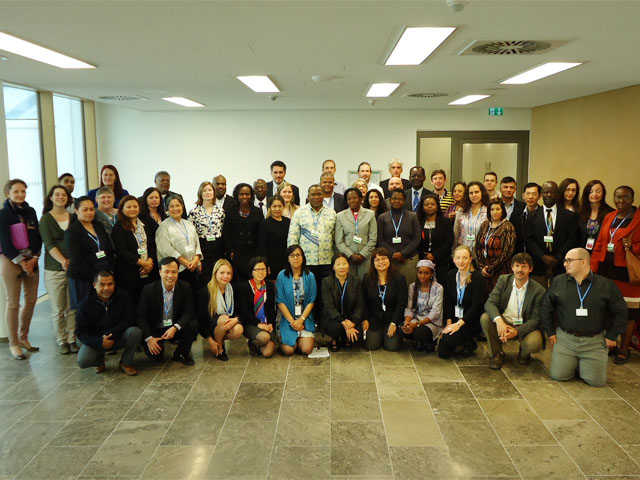
Climate Change Resilience
United Nations looks at how to better integrate Indigenous and Technical Knowledge (ITK) and gender considerations into climate change adaptation work.
The United Nations Framework Convention for Climate Change (UNFCCC) brought together policy makers, traditional communities, adaptation practitioners, civil society groups, research institutions and regional/international organisations to look at how to better address ITK and gender concerns in adaptation planning.
This was the first time that the UNFCCC has brought government representatives and experts together to discuss what is now recognised as a very important component of adaptation planning. The Pacific was also well represented in this experts meeting, with representatives from SPREP, USP, Nauru, Vanuatu and also the University of Hawaii.

The workshop focused on the sharing of experiences, lessons learned and best practices on adaptation planning, and looked at how work on gender and ITK may be further enhanced, and the role that the UNFCCC might play in taking this forward.
SPREP was invited by the UNFCCC Secretariat to share some of its own lessons from gender in adaptation planning, and shared experiences from the Pacific Adaptation to Climate Change Project (PACC), which SPREP currently implements across 14 Pacific island nations, in partnership with the GEF, UNDP and Government of Australia.
Recognising the important role that gender considerations play in the successful implementation of any climate change work in the Pacific, the PACC project engaged the expertise of a gender specialist in 2012. SPREP has since been working with gender experts from a wide range of partners to assist countries to integrate gender roles and considerations not only into the on-going work of the PACC project in all countries, but has also incorporated some of these lessons into other on-going climate initiatives.
For more information on the Pacific Climate Change Gender Took Kit, contact Peniamina Leavai. For more information on the UNFCCC and its work streams related to gender and ITK, including the recent workshop, contact Diane McFadzien.
The United Nations Framework Convention for Climate Change (UNFCCC) brought together policy makers, traditional communities, adaptation practitioners, civil society groups, research institutions and regional/international organisations to look at how to better address ITK and gender concerns in adaptation planning.
This was the first time that the UNFCCC has brought government representatives and experts together to discuss what is now recognised as a very important component of adaptation planning. The Pacific was also well represented in this experts meeting, with representatives from SPREP, USP, Nauru, Vanuatu and also the University of Hawaii.

Image (c) UNFCCC Secretariat
The workshop focused on the sharing of experiences, lessons learned and best practices on adaptation planning, and looked at how work on gender and ITK may be further enhanced, and the role that the UNFCCC might play in taking this forward.
SPREP was invited by the UNFCCC Secretariat to share some of its own lessons from gender in adaptation planning, and shared experiences from the Pacific Adaptation to Climate Change Project (PACC), which SPREP currently implements across 14 Pacific island nations, in partnership with the GEF, UNDP and Government of Australia.
Recognising the important role that gender considerations play in the successful implementation of any climate change work in the Pacific, the PACC project engaged the expertise of a gender specialist in 2012. SPREP has since been working with gender experts from a wide range of partners to assist countries to integrate gender roles and considerations not only into the on-going work of the PACC project in all countries, but has also incorporated some of these lessons into other on-going climate initiatives.
For more information on the Pacific Climate Change Gender Took Kit, contact Peniamina Leavai. For more information on the UNFCCC and its work streams related to gender and ITK, including the recent workshop, contact Diane McFadzien.